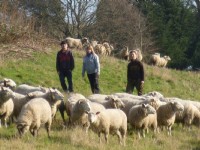Sheep start at boarding school
 Numbers suddenly increased at the Royal Alexandra and Albert School when a flock of sheep came to join pupils in Gatton Park. The flock of around 50 sheep arrived this week and can now be found in fields surrounding the School’s boarding houses.
Numbers suddenly increased at the Royal Alexandra and Albert School when a flock of sheep came to join pupils in Gatton Park. The flock of around 50 sheep arrived this week and can now be found in fields surrounding the School’s boarding houses.The sheep are all pregnant ewes on loan from a local farmer. In a few weeks they will return to the neighbouring farm for lambing. The school will take some of the lambs and raise them on its pasture until they are ready for the market. The lambs will not be named, as pupils are well aware that they are destined for the table. Last year, pupils raised nine piglets which were eventually sold for meat to the Oxo Tower Restaurant.
The sheep, along with the goats, horses, chickens and bees that are already at the school, will be a learning resource for the School’s Animal Care BTEC course. Pupils on the course learn how to care for animals and the sheep will give them valuable experience of an animal that is a common feature of British farming. Managing sheep not only includes caring for the livestock themselves, but also managing their environment. Pupils on the course will learn other important skills such as fencing, driving a tractor and developing biodiversity.
Teacher Bob Greenhalgh, who is Head of Land Based Studies at the School, explains “The sheep are not only a valuable learning resource, but an important part of managing the parkland. If we did not have sheep grazing the fields around the school the landscape would soon turn to scrubland. By maintaining the grassland with a grazing regime, pupils are learning how a grazed meadow environment encourages wild flowers including wild orchids.”
He continues “Other pupils benefit from having sheep on site as they help to care for them after school in our ‘Animal Club’. Pupils will be able to visit the ewes at the local farm during lambing and they will then care for them through to the point when they are sold at market.”
15 year old Ollie Horncastle who is studying for BTECs in Countryside and Environment and Animal Care alongside his more traditional GCSE options, enjoys the range of activities on the course. “We are learning how to drive tractors, chop wood, trap moles, maintain graveyards and look after animals. At home we keep some animals such as geese and sheep and whilst I am not considering a land-based career I would like to have a small-holding when I am older.”
When 16 year old Daisy Savin leaves school she is hoping to continue her studies at a specialist agricultural college. “I’ve always loved being outside. I want a career that allows me to work with animals and on the land.”
In recent days the Government has announced that some vocational qualifications will not count towards the numbers of GCSEs that are shown in league tables. Headmaster Paul Spencer Ellis comments “This school will continue to offer its land-based courses as we know they are right for a few pupils and they are a good route to employment. Pupils who attend these courses often go on to further education at specialist agricultural colleges or go straight into work. What’s more, we have established that the removal of these courses from our GCSE results would have a negligible impact on our percentage scores.”
February 2012


